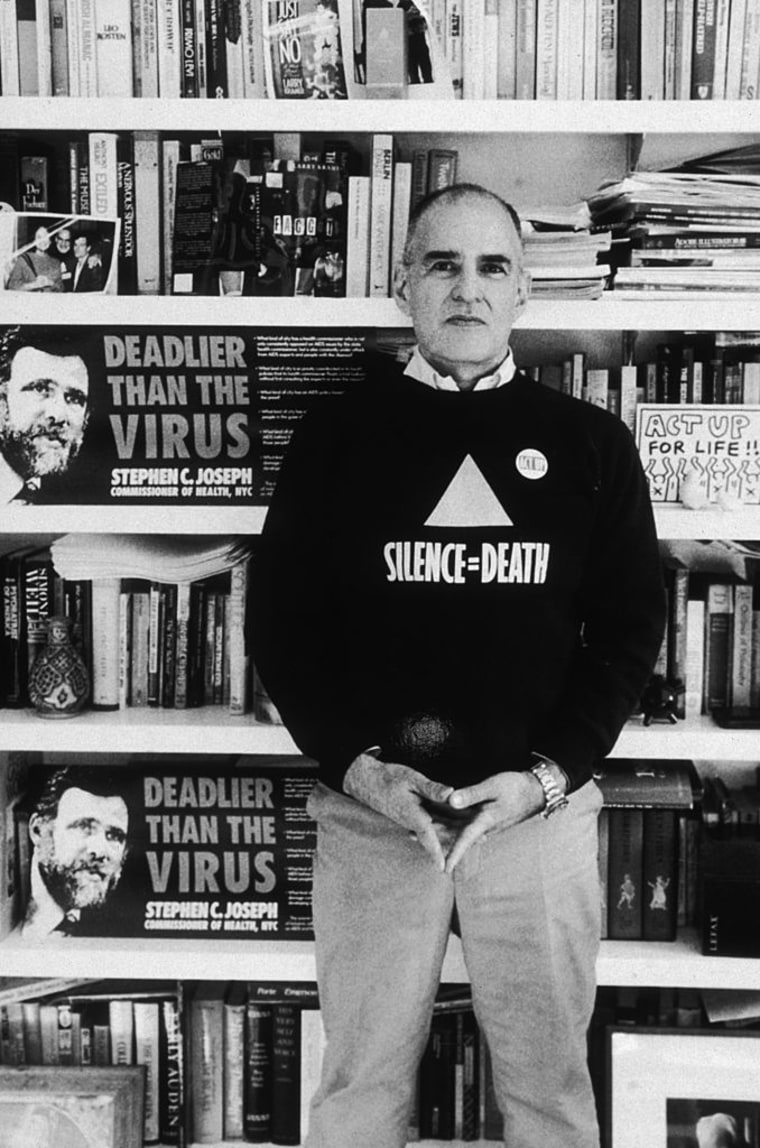Like an entire generation of gay men devastated by the AIDS epidemic, Gaetan Dugas died too young –- a mere 31 years old.
Before his death in 1984, the Canadian flight attendant disclosed to researchers that he averaged 250 sexual partners a year between 1979 and 1981. Dugas -- whose case was documented in the best-selling book "And the Band Played On," which chronicled the spread of AIDS in the U.S. -- was then vilified as “Patient Zero.”

As “Patient Zero,” he was blamed by the media as the cause of the rapidly spreading virus. The epidemic found a face, even though it was one based more in myth than in reality.
“That created the stigma that now exists, and that has existed for the past 35 years around HIV and AIDS –- identifying gay behavior and gay sex as the leading cause for the spread of HIV and AIDS,” Kelsey Louie, CEO of GMHC, told NBC OUT. GMHC, the nation's first HIV/AIDS service organization, was established by six men in the living room of LGBTQ icon Larry Kramer in 1982.
More than three decades later, Kramer, Louie and other leading activists are reacting to the news that “Patient Zero” has been exonerated, thanks to a new genetic study published by researchers at the University of Arizona. These activists all have one thing in common –- they’re not surprised.
“I don’t know why this has suddenly become a story again,” Kramer told NBC OUT. “We’ve known that ‘Patient Zero’ as patient zero didn’t exist from 2011. The first patient zero was in 1921 in the Congo, and it went on from there.”

Kramer is currently completing the second volume of his critically-acclaimed novel, "The American People," his magnum opus that chronicles the history of gay America.
“What I'm particularly fascinated by now is, in 1981, when the first article [on HIV/AIDS] in the Times appeared, it was presented as something brand new in this country, and completely oblivious of what had already been happening in Africa for decades,” he said. “And you can't tell me that somebody here didn't know about that.”
Eric Sawyer, one of the co-founding members of Kramer’s iconic protest group, ACT UP, remembers when the news of “Patient Zero” first broke. He never found it believable that one person could be responsible for spreading so many cases across the U.S. To Sawyer, the news smelled of a witch hunt, as if society was looking for somebody to blame for the appearance of a new and alarming plague -- and gay men were the targets.
“It stigmatized gay men, as I said, like vectors of infection that would be responsible for spreading HIV and other horrible diseases, and that they should be avoided at all costs,” he said. “It created a hysteria, which resulted in gay men being fired from their jobs, evicted from apartments, denied public accommodations and denied health insurance.”
What’s more, the lines of stigma were drawn around a moralistic framework whose thesis was that gay men deserved to be punished for their presumed sexual deviance –- a line of thinking that Louie argues only perpetuated the worst pandemic in modern history.
“Blaming HIV/AIDS on gay sex and the ‘promiscuity’ of gay men has allowed people to essentially say that this was God's way of punishing gay people, as a way for people to say that gay sex is bad sex, and that gay people are at fault for HIV, which studies after studies have proven not to be the case,” Louie said. “HIV does not discriminate. So many different people, straight people, gay people, men, women, people of different ethnicities and races are impacted by HIV/ AIDS.”
RELATED: New Study Shows HIV Epidemic Started Spreading in New York in 1970
But with a “Patient Zero” identified and with the ensuing stigma enveloping around gay culture, birth was given to a whole new movement around fighting not only for gay rights but also for gay lives as Kramer and Sawyer watched their brothers lives ensnared daily by a plague.
“Every success in the gay civil liberties movement can be traced back to some of things that our heroes and pioneers of civil rights, gay civil rights [did], like Larry Kramer, Larry Mass and Edmond White,” Louie said. “We owe all of that to them. We stand on the shoulders of giants today.”
Kramer, for his part, holds firm on one belief about Dugas.
“You know, the fact Gaetan was labeled ‘Patient Zero’ does not deny the fact that he was, I think, an irresponsible gay man,” he said.
RELATED: Activists React to New HIV Study, Debunking of 'Patient Zero' Myth
While “Patient Zero” has now been cleared by science, the stigma lives on. Years and years of widespread misinformation aren’t easily erased.
“Even though there are medications that allow people to live much longer and healthier lives, it's still wrapped up as this horrible plague,” Sawyer said. “And it causes people to be ashamed of their HIV infection, to hide if they're HIV positive.”
The news of “Patient Zero’s” redefined role in history comes at another turning point in the fight against sexually-transmitted diseases, or STDs, in America. While new tools like PrEP, a pill that when taken prophylactically can prevent HIV infection, are now available to those at highest risk of contracting HIV, they are not cheap or readily available. And the most STD cases in history were reported last year.
But certain populations remain disproportionately impacted by the virus. For example, HIV infections increased by 6 percent among gay and bisexual men who have sex with men between 2005 and 2014, according to the CDC. One in two black gay and bisexual men and one in four Latino gay and bisexual men become HIV positive during the course of their lives.
“What it tells us is that the stigma is still alive,” Louie said. “And it is that stigma that has allowed this disease to impact different groups disproportionately.”
“Gay people have been stigmatized since the beginning of time. So, when people talk about HIV's stigma, I say, this is nothing new,” Kramer said. “And it's nothing you're going to get rid of tomorrow. You fight back. That's what ACT UP was all about.”